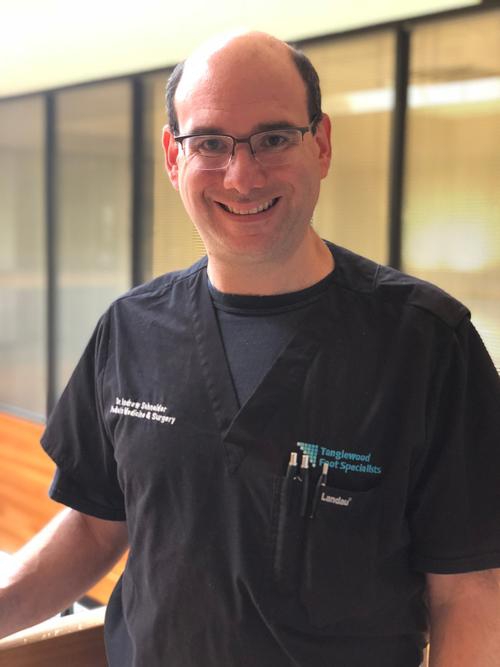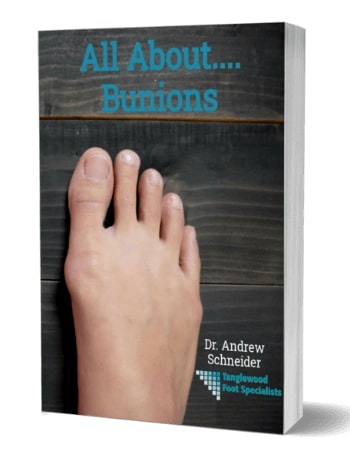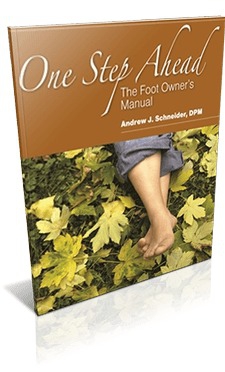 The pain associated with a bunion on your foot is due to inflammation. That inflammation can develop at the bump on the side of your foot. But it can also develop deeper within the joint. For a temporary fix, we can help control bunion pain by reducing inflammation. However, in the long term, the pain will come back (and the bunion will get bigger) unless we address the underlying forces causing that bump to form in the first place.
The pain associated with a bunion on your foot is due to inflammation. That inflammation can develop at the bump on the side of your foot. But it can also develop deeper within the joint. For a temporary fix, we can help control bunion pain by reducing inflammation. However, in the long term, the pain will come back (and the bunion will get bigger) unless we address the underlying forces causing that bump to form in the first place.
Controlling Inflammation with Cortisone Injection to Help Bunions
A cortisone injection is very effective in reducing the pain from a bunion. Because the area of inflammation is so localized, an injection delivers superior pain relief than an oral anti-inflammatory medication. Even so, the results of the injection are likely to be temporary. Over time, the inflammation will build up again, allowing the pain to return. Moreover, recent studies suggest that there may be long-term side effects associated with injections to help bunions and other foot and ankle injuries.
This October 2025 study published in the journal Rheumatology followed soccer players (UK football) who suffered foot or ankle injuries during game play. They discovered that players who suffered these injuries were more likely to develop osteoarthritis later in life. And that likelihood increased dramatically if the players received cortisone injections. But why was that the case?
According to the authors, injection therapies were problematic because "Injections can alleviate pain and allow players to return to games more quickly. However, the treatment may hide underlying joint damage and could accelerate joint structural deterioration over time. The frequent use of injections may also worsen cartilage damage, particularly when combined with the high physical demands required in professional football." And, while this concern was specifically connected to players with sports injuries, we can learn an important lesson before providing injections to help relieve bunion pain.
The Problem with Cortisone Injections for Bunions
As we explained, a cortisone injection will address inflammation, whether that inflammation comes from an injury or a bunion. However, it doesn't address the underlying cause of that injury. When you're an injured soccer player, that means you might get back into the game sooner than it's safe to do so, worsening your injury and increasing your long-term risk for osteoarthritis. And when you have a bunion, that means your feet might feel so much better that you go back to ignoring the bony bump on your foot.
Unfortunately, that's a problem, because small bunions will get bigger unless you address the underlying instability in your foot that caused them to form. You see, the bony bump isn't a sign of extra bone growth. Rather, it's the base of your metatarsal bone. When there are imbalances or instabilities in your feet, the head of the bone can shift inward, toward your other toes. But the bone's base rotates and shifts outward, beyond the profile of your foot, revealing itself as the characteristic bony bump. So, unless you address that foot instability, the bone will continue shifting, and the bunion will become larger.
Lasting Treatments for Bunion Relief
Often, we can relieve bunion pain and stop progression with non-invasive treatments. By fitting you with custom orthotics, we can take pressure off your metatarsal bone. And that should keep the bump from getting bigger. Padding the bunion could also provide pain relief, as can a cortisone injection. In combination, these options will provide better results than a cortisone injection alone. However, it's important to remember that severe bunion deformities are less likely to respond to these conservative treatments. In such cases, orthotics and injections to help bunions are unlikely to provide sufficient relief. Instead, surgery will likely be your best option.
We know that sounds scary, but it should not be a reason to avoid seeking medical care for your foot deformity. You see, if you are experiencing bunion pain, the best time to get it checked and treated is now. Whether it be an injection, padding, custom orthotics, or even bunion surgery, Houston podiatrist Dr. Andrew Schneider will recommend the best and most effective treatment for you.



















